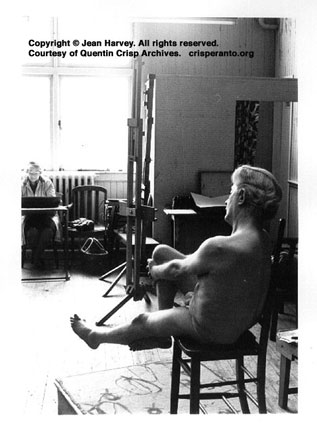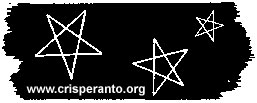 |
|
I would have to say my first exposure to Quentin Crisp was through the film, The Naked Civil Servant. I was so enthralled with the courage of this person to stand up and stand out from his peers. I could relate to his loneliness. Quentin could feel alone in a crowded room — never quite being fulfilled, or truly happy with what life has dealt.
As the years went by, my memory was refreshed about Quentin when the film was aired again on television. I bought the video, as I would not forget again. I also found a slew of Web sites featuring him. One site seemed to have a direct means of contacting the man himself. So, I emailed, "I was around to have tea at The Black Cat Café, maybe you would like to come over for dinner one day when you are free?" Imagine my surprise when I got a reply! It was from Quentin via a friend and keeper of the Web site. Quentin was no longer good with typing. He had a busy schedule and was going to California, I believe. However, he would love to come to Carroll Gardens for dinner one day. I replied to him by traditional mail saying how wonderful it was to hear from him! And what was his preference in cuisine. Basically he would eat anything, but easy on the garlic, as "I am a member of 'Vampires Anonymous,' " he replied. I called him and for the first time heard his voice live as he answered the phone, "Oh, yes?" He had just come back from California earlier that morning, and I was surprised that he would meet with us the next afternoon for dinner. "Us" consisted of my companion Ralph Rispoli and his dear friend Susan Marchand, who on occasion I called "The Madame du Marchand." We had Quentin picked up at his home in a white stretch limousine and brought to Brooklyn where he was wined and dined through several courses. And he delighted us with his words, from him calling himself a "hooligan," with explanation, to hearing him about his favorite actress Rita Hayworth. And he broke out into song, singing "Put the Blame on Me Boys!" It seemed that jet lag had finally gotten the best of him as he started to fade, so we drove him back to his home in the East Village. As a thank-you-for-coming gift, I sent him a box containing a wide assortment of teas. He sent an autographed picture which now hangs on my "Celebrity Wall" at home. As time would have it both Ralph and Quentin died. Both have been greatly missed. |
| I first met Quentin Crisp while he was promoting the film Resident Alien. It was at a screening of the film at the Coolidge Corner Theatre in Brookline, MA. Ms. Grace Sterling Stowell accompanied me that evening. Ms. Stowell was acquainted with Mr. Crisp as she had hosted a book signing for him at the Boston University Bookstore and interviewed Mr. Crisp for one of our local gay newspapers. Quentin Crisp and I crossed paths a year or two later when he came to Boston and did his one-man show at the now-defunct Safari Club. The Safari Club was a bathhouse, and Mr. Crisp was there to help the owner promote the club's "Over 40" night. Ms. Stowell joined me at the event, which proved to be a very, very strange evening. Mr. Crisp was perched on a throne set on a riser. Where management ever found a throne, I will never know. Thirty or so men in towels sat on the floor at his feet, listening to him speak. At the event, I thought to myself, I can do better than this and Ms. Stowell's 40th birthday is next year . . . It could be an event . . . It could be a fundraiser! That evening Mr. Crisp kindly gave me his agent's information, with whom I managed a mutually acceptable date and fee for his appearance the coming year. In early January 1997, I phoned Mr. Crisp and asked if my friend Mr. Cohen and I could share a meal with him. He accepted and in mid January I traveled to Manhattan and, with Mr. Cohen who was residing in the Village at the time, met Mr. Crisp for dinner at Cooper Square Diner. This was the first time I had been with Mr. Crisp outside of a public event, and it will not surprise you that there was very little difference. Mr. Crisp arrived 45 minutes late and apologized to Mr. Cohen and me for his tardiness, explaining that he was on the telephone with someone and did not want to be rude and tell his caller that he did not have time to listen. His hair was tinted lavender and swept up under his black cowboy hat. He was wearing an elegant velvet dinner jacket, a loose ascot, and a lapel pin that labeled him as a "fairy." For dinner, I believe he had an egg, over easy, on white toast with the crust cut away. I also remember him as having a cup of coffee, which struck me as a bit odd. Could this proper English gentleman really have had a cup of coffee? Well, he did. He was becoming American! We spent some time talking about his experiences as a New York celebrity. He said that he was amused by the fact that he seemed to be on the entire New York journalists "quote" list. He was certain that he and Yoko Ono were at the top of these lists! I mentioned that I was envious of both him and the New York theater scene, and asked if he attended much musical theater. "Noise!" was his reply. Although, he said, "I have recently seen Julie Andrews in Victor/Victoria, and enjoyed it very much." He also bemused as to why people would think that he would want to go out and attend such events. Throughout the evening he seemed quite flattered, if not a bit bewildered, that someone as young as Mr. Cohen (twenty-one at the time) knew who he was and was interested in him as an author and performer. I remember Mr. Crisp asking Mr. Cohen how, at his age, he had ever heard of him. It was a reoccurring question that evening. As we walked him back to his flat, we asked a passerby to snap a photograph of us in front of Mr. Crisp's boarding house. The photograph portrays a very proper, very distinguished "Englishman in New York" and his loyal subjects. Over the next few months, I put the details of the show together. I got the space, raised the funds, and called Mr. Crisp frequently to just keep in touch. Again, I was thrilled to even have a reason to call him! In mid July, my friends Mr. Agee, Mr. Cohen, and myself met with Mr. Crisp again for a meal at the Cooper Square Diner. My compatriots and I had arrived at the restaurant a bit early. We spotted Mr. Crisp as he moved down the street with that aristocratic, yet eccentric, air about him. As he zigzagged across the busy Manhattan street, oblivious to the cars screeching and trucks honking, we literally held our breath until he made it all the way across the street where we greeted him at the door of the Cooper Square. Most of our conversation was taken with the details of the upcoming event. Mr. Crisp was affable and agreeable as ever as we described both the vision and the minutia of the coming event. I do, however, remember the topic of Miss Earth Kitt. I have no idea how, but she became a major point of conversation. I clearly remember Mr. Crisp clenching his teeth and singing, in his best Eartha Kitt impression: "Leave you? Leave you? How could I leave you?" from Stephen Sondheim's Follies. Mr. Crisp giggled as he recounted how much he adored Earth Kitt's interpretation of Mr. Sondheim's song. One of the most secretly amusing moments of the meal was listening to Mr. Crisp discuss how rude and annoying he found the actions of organizations such as ActUp. It was an opinion about which he felt strongly and, apparently, had many times expressed this opinion in similar fashion. While Mr. Crisp was on the topic, Mr. Agee and I could barely contain our mirth. Sitting next to Mr. Crisp was Mr. Cohen sporting a blue tank top with the words ActUp printed boldly across the chest. In deference to Mr. Crisp, we each held our tongues. True to his word, Mr. Crisp joined us as a special guest at "Celebrating Forty Years of Sterling," a fundraiser for the Boston Alliance of Gay, Lesbian, Bisexual and Transgender Youth (BAGLY), on July 20, 1997 where much mingling, drinking, and eating transpired. (Grace Sterling Stowell had worked with BAGLY since 1980.) The evening, I believe, was Mr. Crisp's last visit to Boston. The event took place at Club Cabaret, with as many as 110 to 125 people in attendance, and lent itself to being a rather familial evening, especially with the audience participation atmosphere throughout the night. Mr. Crisp was kind enough to sign a few programs, which we also used as incentives for people to donate additional money to the fundraising event. |
| I first met Quentin Crisp in the early nineties when I worked at the North Star Pub, and they were looking for a celebrity to judge a competition at the pub. He agreed to come, provided we supply him with a car and driver, dinner, and a couple of drinks. On the day of the event I called to ask where we should pick him up, and Quentin said, "I live on the street with the Angels." "What do you mean?" I asked. Of course, it turned out that the headquarters of the New York chapter of the Hell's Angels was on his block. "Tell your driver to look for men as tall as trees and twice as shady," he said. I kept in touch with Quentin since that day, usually by phone and somewhat infrequently, but every now and again I would call him out of the blue and we'd chat for a while. Sometimes we'd just bump into each other on the street. In 1992, I invited him to a Halloween party at another restaurant I was managing at the time. "I don't like dressing in strange clothes," he told me. "Quentin," I said, "you dress in strange clothes every day of the year." There was a pause, and then he said, "I'll be there." To my surprise, he reported this story in the newspaper he was writing for at the time. I feel very privileged to have known Quentin Crisp — the man who dared to be himself — and just wanted to share these stories with people who also cared for him. |
|
|
